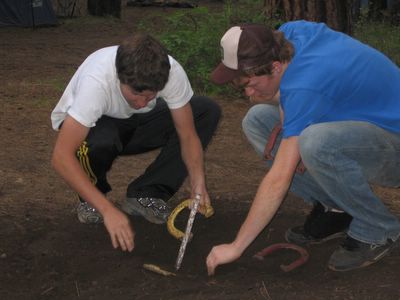The History of Ditch Camp

Bias For Action relaxing at Ditch Camp 2004
The Mister and I (along with several others) have spent the last couple of weeks preparing for a week-long outing in the
Back in the late 50’s and early 60’s (and most likely even before this, the Mister acknowledges, since it was before his birth), families would head to the mountains to get out of the heat for a bit. The Mister’s family established a tradition of going up to the
The location of this annual adventure was at a place actually named “Ditch Camp”; it had been a camp for the construction workers who had carved a ditch – earthen in some places, using an aquaduct pipe in others – to bring water to the small but bustling logging town of
This summer tradition continued throughout the Mister’s high school years, and the boys were allowed to participate even though they spent the summers farming with their fathers. As they ventured off to college and the military, or to start new families, the makeup of Ditch Camp participants varied, and eventually Grandma was no longer able to lead the charge, and the tradition seemed like it would expire and be replaced by new family traditions. After a hiatus of several years, however, the First Cousin fired up the tradition once again, taking her own children back to Ditch Camp, making biscuits and gravy and green chili (on a Coleman stove, though I know she could do it on the fire if she wanted to) and recreating the experience for the next generation.
As the Mister and I were married and had small children by then, we joined in this tradition, returning to Ditch Camp each summer, and soon Bias for Action and his family were there as well, and before you knew it, Ditch Camp was full of barefoot children (won’t they catch cold?), fish that had been caught by a first-time angler (can we cook it now?), and stories of bears around the campfire (daddy, have you seen any bears?). And then disaster struck. Well, sort of. The Apache Indians closed Ditch Camp to camping. And backpacking. You could hike and have a picnic if you bought a permit; but no camping.
Undaunted by this setback, we kept the tradition, but moved the location to various places. Now this experience was morphing once again, with the ages of the kids, the changes of life situations and locales, and friends of the family eager to join the tradition. Having been taught by the best, the First Cousin, I timidly assumed the biscuits and gravy and green chili duty, and watched as the numbers of participants grew every year. The word was out: this is a good time.
No matter how we tried to re-name every site in which we camped, (how about “Beaver Rapids”?) folks kept calling it Ditch Camp. Eventually, we acquiesced to the obvious and decided that Ditch Camp would now describe the experience, not the location.
Things have changed tremendously since Grandma cooked those biscuits over the fire. Change can be difficult; the experience is just not the same as it used to be, even for me, and I’ve only been involved for about 20 years. I married a change agent, however, and he has taught me much about not just accepting, but embracing, change; it’s a heckuva lot better than fighting it. Ditch Camp, the Experience, continues to be one of the most meaningful weeks of the year for many people.
And the next generation? Will they carry on the tradition of Ditch Camp? They move mountains to be there every year if at all possible. My daughters can put up a tent as fast as their brother, and the Mister and I are coaching them in taking more responsibility every year. Someday that gigantic cast iron skillet will be too heavy for me to lift. I suspect that several in the next generation will pick up the skillet and share the experience with their own children.

Our son and Bias For Action's son playing horseshoes at Ditch Camp 2004

0 Comments:
Post a Comment
<< Home